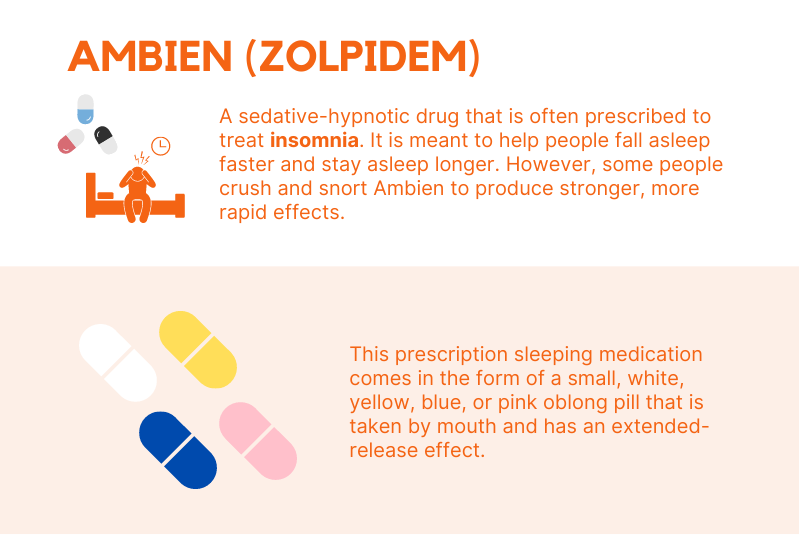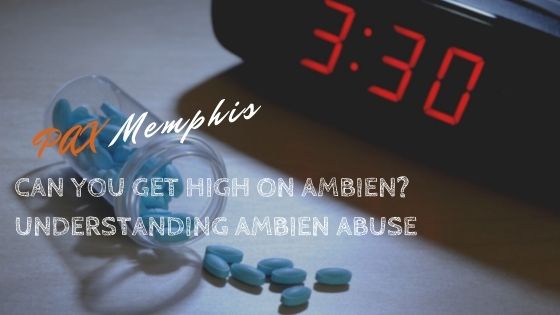Ambien (zolpidem) is a powerful sedative prescription medication that is used to treat insomnia. When taking in high doses, the drug can produce euphoric and hallucinogenic effects. Ambien abuse, however, is extremely dangerous and can lead to addiction if taken for longer than two weeks or at higher doses than one is prescribed.
What is Ambien (Zolpidem)?

Ambien is the brand name formulation of zolpidem, a sedative-hypnotic drug that is often prescribed to treat insomnia. This prescription sleeping medication comes in the form of a small, white, yellow, blue, or pink oblong pill that is taken by mouth and has an extended-release effect. It is meant to help people fall asleep faster and stay asleep longer. However, some people crush and snort Ambien to produce stronger, more rapid effects.
The manufacturers of Ambien are notorious for their widespread marketing techniques, making the drug a household name as well as something that is frequently seen in popular culture. This sleep aid was originally marketed as a safer and less addictive alternative to benzodiazepines, however, users and physicians alike quickly realized the addictive qualities of the drug.
Today, Ambien is a schedule IV controlled substance according to the Drug Enforcement Agency (DEA). Even though this scheduling suggests rare recreational use, many users abuse Ambien by taking too high of a dose, snorting it, injecting it, or taking it to produce euphoric and hallucinogenic effects. Since the medication is habit-forming, it is typically only prescribed for short-term treatment of fewer than two weeks.[1] Abusing the drug or taking it long-term can be dangerous.
Can You Get High on Ambien?
Zolpidem tartrate, the active ingredient in Ambien, works by increasing the relaxing effects of GABA – a neurotransmitter in the brain that is associated with insomnia, relaxation, anxiety, mood, and more. Although it is not a narcotic, the drug is a depressant that produces calming effects on the body, therefore, you can get high on Ambien if you abuse it.
If a person swallows Ambien, the high will set in around 30 minutes after taking the drug and last for several hours. If someone is snorting Ambien, the high may set in faster, but last for a shorter period of time. Some people who are addicted to Ambien will abuse it by injecting it intravenously for an even stronger, more powerful high.
When someone gets high on Ambien, they will feel extremely groggy, drowsy, and euphoric. They may also begin to have auditory or visual hallucinations. Oftentimes, the effects of Ambien abuse will look similar to alcohol or benzodiazepine intoxication.
What are the Dangers of Ambien Abuse?
Ambien abuse occurs in many different forms. For example, taking the drug without a prescription, purchasing the drug on the streets, taking a higher dose than what you are prescribed, or snorting or injecting Ambien are all forms of drug abuse.
Some people believe that Ambien is safer than some other benzodiazepines because there is a lower potential for overdose. However, this isn’t necessarily true. While users may need to take more Ambien to overdose than they would other benzodiazepines, the signs and symptoms of an Ambien overdose are difficult to detect. In most cases, the symptoms simply mirror those of Ambien intoxication.
When taken in large doses, Ambien slows down breathing, heart rate, and other essential bodily functions. If an overdose occurs, it can lead to respiratory failure and death. If a person has taken Ambien and has seriously slowed or shallow breathing, they may be experiencing an overdose.
Another danger that is commonly associated with Ambien abuse is the potential for risky and dangerous unconscious behavior. For example, sleepwalking, memory problems, sleep eating, sleep-driving, and changes in behavior are all common side effects of taking Ambien.[2] In fact, Ambien is better known for its bizarre side effects rather than the high it can produce.
One popular way in which Ambien is abused is by mixing the substance with alcohol. People will drink while taking the medication to amplify the sedative effects of the medication, however, doing so is extremely dangerous and increases the risk of overdose. It is also just as dangerous to mix Ambien with other benzodiazepines like Valium, , or Halcion. Polydrug use such as this not only increases the risk of overdose, but the risk of damage to the brain, heart, lungs, and other bodily systems, as well.
Can You Get Addicted to Ambien?
By taking Ambien in higher doses than one should, their body will build up a tolerance to the point where they need to take larger doses to feel the effects. At the same time, increasing tolerance then leads to physical dependence where users experience withdrawal symptoms if they aren’t taking the drug. Dependence and tolerance are two qualities that indicate an addiction.
In general, it takes people longer to get addicted to Ambien than it does to other benzos and the withdrawal symptoms tend to be less severe.[3] Still, the drug is addictive, and physical dependence can develop in as little as two weeks. People who abuse Ambien are more likely to get addicted to it, however, people who take it for insomnia for extended periods of time may also develop an addiction.
Signs and symptoms of Ambien addiction include:
- Doctor shopping or refilling prescriptions more often than usual
- Taking higher doses than prescribed or snorting or injecting the drug
- Having intense drug cravings and compulsions to use the drug
- Spending large amounts of time and money on the drug
- Experiencing Ambien withdrawal when suddenly ceasing use of the drug
- Isolating from friends and family
- Lying about substance abuse
- Changes in mood or declining mental health
- Experiencing problems at work, school, or home due to drug abuse
- Feeling unable to quit using Ambien despite wanting to
- Continuing to use the drug even when it is worsening an existing mental or physical health problem
Ambien abuse typically occurs in people who use the drug for insomnia but develop tolerance and underestimate how addictive the substance really is. Unfortunately, once tolerance and dependence develop, it is sometimes too late. At this point, many users struggle to quit taking Ambien without professional help.
Find Help for Ambien Addiction Today
Medical detox is the first step to overcoming Ambien addiction. Detox can help you taper off the substance so your withdrawal symptoms aren’t too bad. Then, you can move on to inpatient or outpatient rehab where clinicians will work with you to teach you the skills you need to stay sober.
If you or a loved one are struggling with Ambien abuse or addiction and are ready to get started on a better life, reach out to one of our dedicated addiction specialists today.
References:
Medically Reviewed: September 25, 2019

All of the information on this page has been reviewed and verified by a certified addiction professional.










